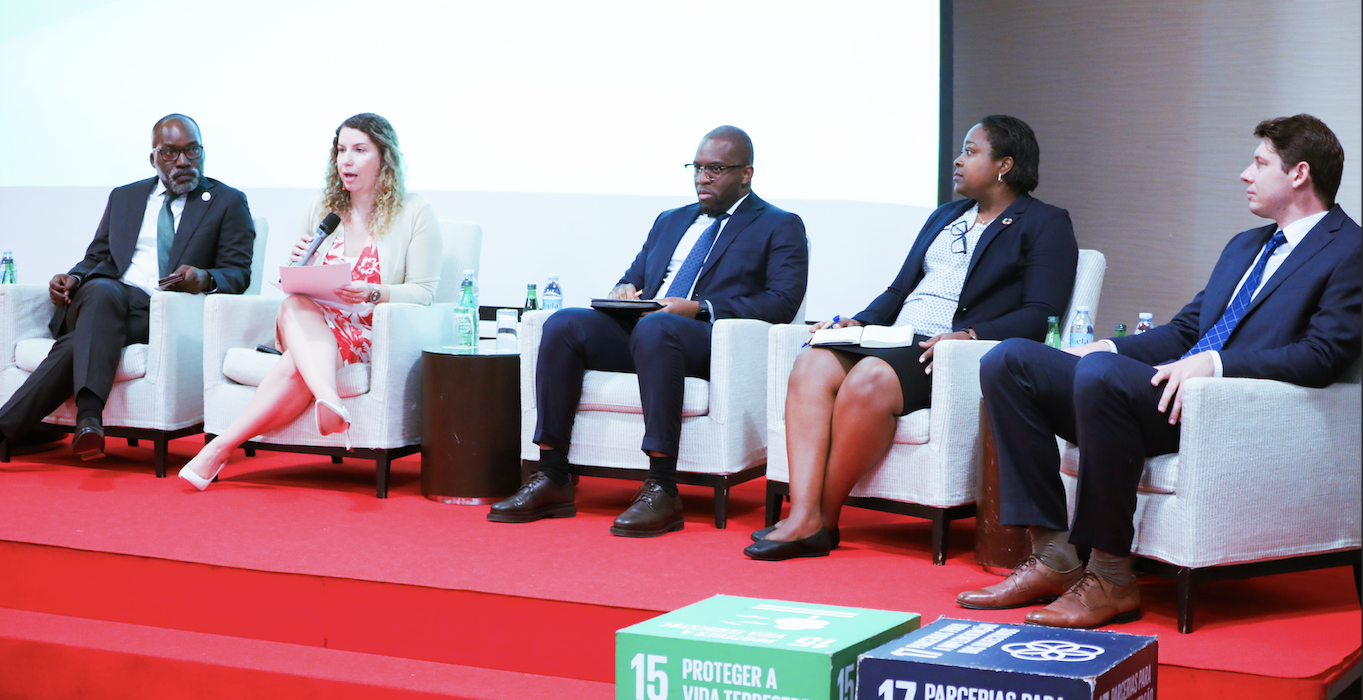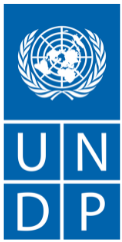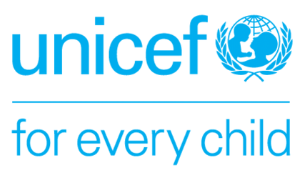About the Event:
📌 National Dialogue on Climate Finance
🏠 The government of Angola, UN in Angola, UNDP
⏰ Tuesday, 30 April 2024
📍 Luanda, Angola
The National Dialogue on Climate Finance was held in Luanda, Angola on April 30, 2024. The event facilitated discussions among key actors from the public and private sectors to share experiences and perspectives on climate finance in Angola.
Scenes from the Dialogue.
Recommendations from the panel discussions:
PANEL I: How to Expand Climate Financing in Angola
1) Institutionalization of the National Climate Fund as the instrument that facilitates access,mobilization and coordination with the various sources for financing for adaptation and mitigation of climate change, in line with the 2022-2035 National Strategy for Climate Change (ENAC), and should be regulated by private law and have financial and administrative autonomy;
2) Instrumentalize the National Commission for Climate Change and Biodiversity as a vehicle for implementing climate action, as provided for in ENAC;
3) Disseminate the Operational Framework for Sustainable Development developed by theMinistry of Finance (MINFIN), as well as disseminate the eventual Action Plan for Attracting Climate Financing and engage the various actors who must operationalize ENAC;
4) Increase funding for action on climate change but also increase the efficiency of financing/use of funds, having concrete objectives and projects ;
5) Create an institutional platform/mechanism for the interaction of different actors, stimulating the connection between the different sources of financing and the search for financing (including the dissemination of information/promotion within civil society and other actors that are more appropriate to certain financing instruments);
6) Carry out a detailed diagnosis to understand what Angola must do to access different sources of climate financing;
7) Ensure access to climate financing at a decentralized level (provincial and municipal);
8) Develop an Action Plan to attract Funding with details of who, how much, when, how, etc. interms of mobilizing climate finance;
9) Carry out regular reviews and continuous monitoring of the country's efforts in seeking financing and implementing climate action projects.
PANEL II: Innovative Climate Financing Mechanisms
1) Renewable energies must be seen as a great potential for Angola, as increased production can be a source of funds for climate action through the export of surplus renewable energy production;
2) An inventory of the potential ofAngolan forests must be completed, which can also be a source of financing considering its different applications;
3) Angola must prepare to better equip the business environment to respond to the great challenges in accessing the global funds allocated to the sub-Saharan region for private investment, considering the paradox in which, there is a large economy at the national level but an economy the private sector is very small and is not attractive to investors;
4) Necessary instruments to increasingly attract and promote other sources of financing such as green banks, blue and green are good. Conditions already exist in the country, such as a functioning stock exchange and a framework of instruments, with only work to begin to move forward and achieve the necessary goals ;
5) Capital markets and the role of the private sector: Angola has a high potential to mobilize private financing to achieve the SDGs and NDCs. The capital market offers an opportunity in this regard. The Ministry of Finance and the Angolan Debt and Stock Exchange (BODIVA) play a key role. The country adopted the Operational Framework for Sustainable Financing (Presidential Decree no. 106/23) which allows issuing green and social bonds related to sustainable development projects, including the sectors identified in Angola’s NDCs;
6) At least US$5 million must be invested in the recovery of the renewable energy project in BaiaFarta, as well as the allocation of financing for the rehabilitation of dams, to generate anothersource of financing.
PANEL III: Carbon Market as a Source of Climate Finance
1) As a precautionary measure, there is a need to carry out a strategic assessment to adapt projects to certification mechanisms;
2) A National Market must be defined and regulated to determine the types of projects and thecreation of a technical group to work on its regulation, within the scope of the national Commission for Climate Change and Biodiversity, also bringing the different actors to participate in this process;
3) Joint consultation must be carried out within the scope of the National Commission on Climate Change and Biodiversity, regarding the country's priorities on the Carbon Market, including integrity issues;
4) Assign the National Monitoring, Reporting and Verification System (MRV) within the scope of its mitigation subsystem the responsibility to prepare a national registry.
Where can I find the full summary?
To read the full summary of the event and key recommendations click here
Recommendations from the panel discussions:
PANEL I: How to Expand Climate Financing in Angola
1) Institutionalization of the National Climate Fund as the instrument that facilitates access,mobilization and coordination with the various sources for financing for adaptation and mitigation of climate change, in line with the 2022-2035 National Strategy for Climate Change (ENAC), and should be regulated by private law and have financial and administrative autonomy;
2) Instrumentalize the National Commission for Climate Change and Biodiversity as a vehicle for implementing climate action, as provided for in ENAC;
3) Disseminate the Operational Framework for Sustainable Development developed by theMinistry of Finance (MINFIN), as well as disseminate the eventual Action Plan for Attracting Climate Financing and engage the various actors who must operationalize ENAC;
4) Increase funding for action on climate change but also increase the efficiency of financing/use of funds, having concrete objectives and projects ;
5) Create an institutional platform/mechanism for the interaction of different actors, stimulating the connection between the different sources of financing and the search for financing (including the dissemination of information/promotion within civil society and other actors that are more appropriate to certain financing instruments);
6) Carry out a detailed diagnosis to understand what Angola must do to access different sources of climate financing;
7) Ensure access to climate financing at a decentralized level (provincial and municipal);
8) Develop an Action Plan to attract Funding with details of who, how much, when, how, etc. interms of mobilizing climate finance;
9) Carry out regular reviews and continuous monitoring of the country's efforts in seeking financing and implementing climate action projects.
PANEL II: Innovative Climate Financing Mechanisms
1) Renewable energies must be seen as a great potential for Angola, as increased production can be a source of funds for climate action through the export of surplus renewable energy production;
2) An inventory of the potential ofAngolan forests must be completed, which can also be a source of financing considering its different applications;
3) Angola must prepare to better equip the business environment to respond to the great challenges in accessing the global funds allocated to the sub-Saharan region for private investment, considering the paradox in which, there is a large economy at the national level but an economy the private sector is very small and is not attractive to investors;
4) Necessary instruments to increasingly attract and promote other sources of financing such as green banks, blue and green are good. Conditions already exist in the country, such as a functioning stock exchange and a framework of instruments, with only work to begin to move forward and achieve the necessary goals ;
5) Capital markets and the role of the private sector: Angola has a high potential to mobilize private financing to achieve the SDGs and NDCs. The capital market offers an opportunity in this regard. The Ministry of Finance and the Angolan Debt and Stock Exchange (BODIVA) play a key role. The country adopted the Operational Framework for Sustainable Financing (Presidential Decree no. 106/23) which allows issuing green and social bonds related to sustainable development projects, including the sectors identified in Angola’s NDCs;
6) At least US$5 million must be invested in the recovery of the renewable energy project in BaiaFarta, as well as the allocation of financing for the rehabilitation of dams, to generate anothersource of financing.
PANEL III: Carbon Market as a Source of Climate Finance
1) As a precautionary measure, there is a need to carry out a strategic assessment to adapt projects to certification mechanisms;
2) A National Market must be defined and regulated to determine the types of projects and thecreation of a technical group to work on its regulation, within the scope of the national Commission for Climate Change and Biodiversity, also bringing the different actors to participate in this process;
3) Joint consultation must be carried out within the scope of the National Commission on Climate Change and Biodiversity, regarding the country's priorities on the Carbon Market, including integrity issues;
4) Assign the National Monitoring, Reporting and Verification System (MRV) within the scope of its mitigation subsystem the responsibility to prepare a national registry.
Where can I find the full summary?
To read the full summary of the event and key recommendations click here















.png)


